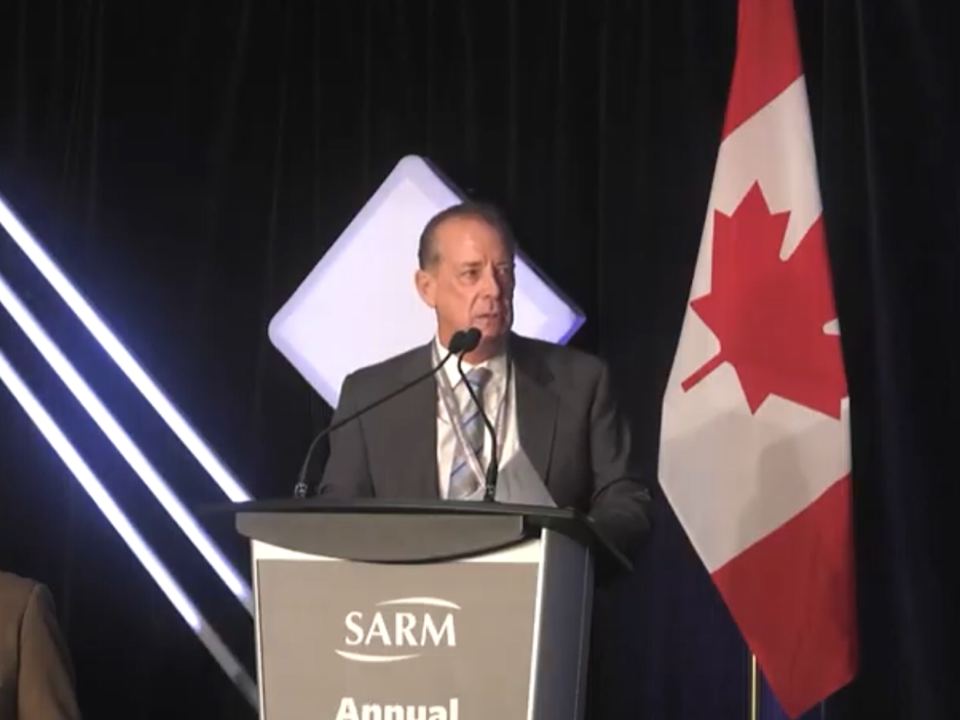REGINA - In his address to delegates at the Saskatchewan Association of Rural Municipalities convention in Regina, Minister of Government Relations Don McMorris was tight-lipped about what rural municipalities can expect in the budget.
“I was thinking about what to say and you know next week, a week from today, is budget so I can’t talk about anything that’s in the budget that’s coming out, and tomorrow the Premier speaks at 1 o’clock and he’s got a couple of announcements so I can’t speak about that, so thank you very much for having me,” said McMorris.
But in his final address at SARM as Minister Government Relations before departing politics in the next election, McMorris did touch on several topics of interest to the delegates. He spent considerable time speaking about the opportunities and challenges around a prime topic to municipal leaders: funding for projects from the various levels of government.
One opportunity McMorris spoke about on Wednesday morning is targeted sector support: a $1.5 million program from municipal revenue sharing which is aimed at municipalities interested in working with other municipalities on connecting and cooperation.
In the first intake, 17 projects for over $850,000 were accepted, with nine of those going to rural municipalities. McMorris urged those who weren’t successful this time to reapply in the next intake.
McMorris spoke at length about the ICIP program, the Investing in Canada Infrastructure Program. He noted that program is sunsetting, and that is a concern for McMorris because of the need for federal funds for infrastructure.
He said they have been lobbying the federal government to look at another iteration of ICIP because it is an “extremely important project, when you can have three levels of government, the federal government, the provincial government and municipal governments dealing with the infrastructure deficit we’re facing in this province.”
As examples of what the three levels of government were doing to address infrastructure, McMorris pointed to the recent announcement of $51 million going to over 30 projects related to water, including ones in the RM of Milton and RM of Livingston.
McMorris also confirmed more than $8.2 million from the federal and provincial governments along with municipalities going towards 12 bridge and culvert replacements or upgrades in RMs across rural Saskatchewan.
The projects include new culverts in the RMs of Enniskillen No. 3 and Frenchman Butte No. 501. Lomond No. 37 and Star City No. 428 are among those getting funding for bridge replacement projects, according to a news release.
McMorris urged the delegates to call for having ICIP continue in some form.
“If you have any chance to lobby the federal government in the future, please lobby for more ICIP money that has few strings attached, so we can target the issues in the areas that you need to address within your municipality. It is extremely important,” McMorris said.
McMorris also spoke about municipal revenue sharing, and while he did not divulge details of what Premier Scott Moe would say at SARM the next day, he did indicate it would be an optimistic message.
“The announcement tomorrow and what revenue sharing will be in all the municipalities is a very, very strong message. It’s a message about growth in this province.”
As a final word, McMorris spoke about the education property tax and the way education used to be funded in the province. He spoke of the tax revolts that took place when he first started, and how the formula was set at 60 per cent of property tax and 40 percent from government.
“I’m proud to say that is exactly flipped. This year education will be funded 60 percent from provincial government and only 40 percent on a stable education property tax mill rate. In fact in 15 years the education property tax mill rate has only been adjusted twice. So people within this province have stability on the property tax.”
The reason he brought it up, McMorris said, was that there was a lot of media around the dispute between Saskatchewan Teachers’ Federation and the government.
“There has been some inkling and people talking about maybe we should start allowing school divisions to increase education property tax, and we don’t think as a government that is a good thing. I guarantee we will be back into tax revolt after tax revolt.”






